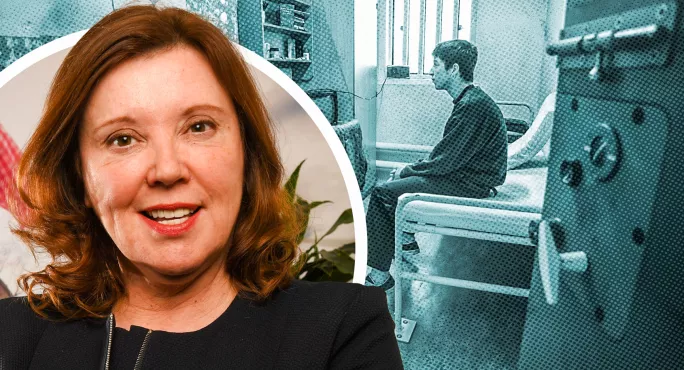Schools told to do more to keep pupils out of youth justice system

The childrenŌĆÖs commissioner has set out a raft of measures for schools to help keep young people out of the youth justice system.
Dame Rachel de SouzaŌĆÖs report examines the lives of 950 young people caught up in the youth justice system whose ŌĆ£experiences reveal systemic failures, with many having been let down by services at every stage of their livesŌĆØ.
To prevent young people from ending up in prison, Dame Rachel says schools should be made statutory 51║┌┴Ž partners alongside local authorities, health services and police.
She says all school exclusions should lead to an intervention. ŌĆ£When a child is removed from the classroom, whether through internal exclusion, suspension, permanent exclusion, a managed move or implementation of a ŌĆśpart-time timetableŌĆÖ, this should be an opportunity to learn about the childŌĆÖs underlying needs.ŌĆØ
Keeping students out of the youth justice system
Schools should be required to outline how sanctions, including suspensions, permanent exclusions and isolation, ŌĆ£will be a trigger point for additional supportŌĆØ, the report says.
This would involve setting out how schools will work with the child and their family to understand any underlying challenges that have led to their behaviour, and to put in place extra support where needed.
Dame Rachel proposes a single-child plan to coordinate all multi-agency support for young people, to be regularly reviewed at least every year and always when a child moves local authority.
The plan should give schools the ability to commission support services from health and social care when childrenŌĆÖs attendance starts to deteriorate.
Alongside this, the commissioner calls on the government to invest in mainstream schools ŌĆ£to create more inclusive learning environmentsŌĆØ.
Children who are excluded should never be without education even while awaiting a placement, the report says. Dame Rachel says Ofsted should hold schools and local authorities accountable for ensuring that children who are excluded still receive high-quality education while they wait for a placement.
Support services from a wide range of professionals should be delivered on school sites to provide the targeted early help that young people need, the report adds.
- Disruption: Suspensions and exclusions up by a third in a year
- Behaviour in schools: Is it really getting worse?
- ChildrenŌĆÖs commissioner: Six key insights from report
The report examines the experiences of 950 young people before and during their time in youth custody, identifying where children last attended school before their time in prison. At any given time, around 400 children are held in just 14 youth settings of differing structures and quality in England and Wales.
The research says that 77 per cent were persistently or severely absent in their most recent year at school - a rate three times higher than that of their peers (24 per cent in 2021-22).
Among the 950 young people, the rate of severe absence was more than 20 times higher (35 per cent compared with 1.7 per cent). Some 25 per cent had been permanently excluded while at school. By contrast, there were eight permanent exclusions per 10,000 pupils in state-funded schools in 2021-22.
More than half were out of education for at least one academic year before moving into a secure setting, with some missing three or more academic years.
Nearly nine in 10 grew up in areas with above average levels of child poverty. Only 20 per cent of those who sat an English and maths GCSE passed, compared with around 70 per cent of their peers.
More than a third of the young people had most recently been registered to attend a registered educational setting in the West Midlands, with 18 per cent most recently attending a registered setting in Birmingham.
Dame Rachel says she will be writing to the relevant local authorities ŌĆ£to understand why such concentrations exist and to demand preventative action is taken that learns from the experiences of these children.ŌĆØ
Dame Rachel says there are cases where it is necessary to temporarily remove a child from a classroom, a school or even the community, ŌĆ£but that shouldnŌĆÖt mean that the system gives up on themŌĆØ.
ŌĆ£It should be a trigger for more intervention and support, not less. But, well before this point, it underlines the singular importance for children of good attendance and positive engagement with school,ŌĆØ she adds.
ŌĆ£This report does not excuse criminality, nor attempt to ignore the hard task of rehabilitation, but instead proposes a series of solutions designed to unite services and deliver them in a way that reflects how children experience them. ŌĆ£
The Department for Education has been approached for comment.┬Ā
Register with Tes and you can read two free articles every month plus you'll have access to our range of award-winning newsletters.
Keep reading with our special offer!
YouŌĆÖve reached your limit of free articles this month.
- Unlimited access to all Tes magazine content
- Save your favourite articles and gift them to your colleagues
- Exclusive subscriber-only stories
- Over 200,000 archived articles
- Unlimited access to all Tes magazine content
- Save your favourite articles and gift them to your colleagues
- Exclusive subscriber-only stories
- Over 200,000 archived articles
topics in this article



